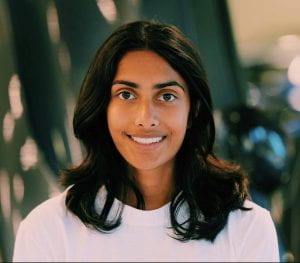Neha Gupta

Which grant that you received do you want to talk about?
Summer URG
Please provide a brief summary of your research.
I was investigating how A549s, a patient derived lung cancer cell line, essentially hijack the circadian clock. Every cell in our body has a circadian rhythm, and we can visualize how long a cell’s circadian period lasts in a device called the LumiCycle. There have been numerous studies investigating the relationship between circadian disruption (via shift work) and the development of cancer. Previous research by Dr. Clara Peek showed a bidirectional interaction between HIF-1a (a protein involved in the cellular response to low oxygen conditions) and BMAL1 (a core circadian clock component). Since tumor cells are naturally in low oxygen conditions, this relationship is pathologically relevant. Other scientists showed that circadian disruption leads to lung tumorigenesis, but we were investigating the opposite pathway – that being how A549s take over the circadian clock to benefit their growth and proliferation . My goal was to treat cells with different drugs that worked on our proposed signaling pathway and measure the length of the cell’s circadian period.
What made you initially interested in researching your project in particular?
I didn’t have a particular interest in circadian biology until I took Bio 203, where we briefly went over how the circadian clock works. From there, I knew I wanted to work in a circadian lab. I had a previous interest in muscle physiology and injury repair, which is the main focus of the Peek lab and my initial reason for joining. When I arrived, one of the research techs, Adam Steffeck, mentioned that he needed help with the lab’s lung cancer project. Although lung cancer and muscle physiology share few commonalities, the shared circadian component was my main motivation for helping with this project. From there, I began training in the lab and was ready to commit to the project full time when summer rolled around.
What made you interested in pursuing (interdisciplinary) research more broadly?
I knew I wanted to start doing research because of my classes. I always found everything we learned so interesting, but never felt like I could fully grasp how these concepts applied to a real world setting. Techniques always seem practical when learning about them in lecture, but I wanted to experience the scientific process myself. I wanted to see how the things we learned failed, understand why they failed and make judgement calls as to what the next move should be to push the project forward. I saw research as a way to bring the content we cover to fruition, which was my main motivation to get involved.
Describe your experiences with research thus far. Was it tricky? What skills do you think you’ve gained?
I’ve loved my experience so far, but I can’t say that every moment has been easy. Seeing your experiments that you’ve planned and set up for weeks fail because of reasons outside your control can be frustrating, and you have to learn to come back and think about your own work critically. I think the trickiest part is being able to ask the right questions at the right times. If you didn’t get the result you wanted, was it because of a procedural error? Or is something mechanistic? I think I’ve gotten better at knowing when and where to ask these questions over the summer. Furthermore, my bench skills and scientific intuition have increased greatly over this time as a result of the experience, even when things failed.
Any tips or advice you have for students similar to you that are interested in pursuing undergraduate research?
I think the best thing I’ve learned over the past few months working in the lab is to never feel scared to ask questions or reach out to others, whether that is your PI, a potential PI, or someone who’s project you are particularly interested in. There were a few times I was scared to reach out to my PI with questions or to present data, just because I was worried she would be too busy. Those meetings, which I thought would only last a few minutes, often turned into hour long discussions criticizing the pathway and developing new experiments. I am by no means an expert in the field, so it was critical for me to ask questions to further my understanding. Even if you think your questions are elementary or are wasting someone’s time, everyone was in your shoes learning at some point. People are always willing to help if you show initiative, so never, ever be afraid to reach out.
